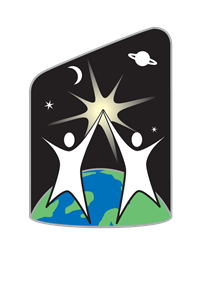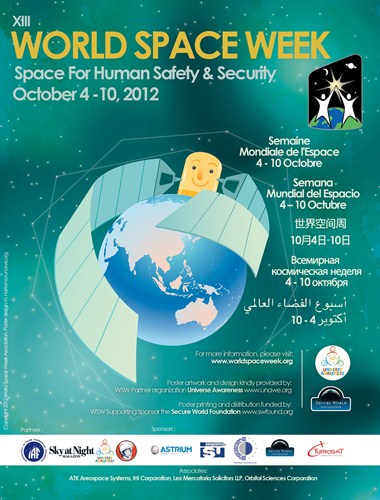- Created: Thursday, August 09 2012 08:00
 Astronomers Without Borders has signed a Memorandum of Understanding (MOU) with World Space Week Association to jointly celebrate World Space Week on October 4–10 every year.
Astronomers Without Borders has signed a Memorandum of Understanding (MOU) with World Space Week Association to jointly celebrate World Space Week on October 4–10 every year.
World Space Week is an international celebration of science and technology, intended to educate, encourage, and inspire people everywhere in the human outreach toward space. The United Nations General Assembly declared in 1999 that World Space Week will be held each year from October 4–10. These dates commemorate two events:October 4, 1957:
- Launch of the first human-made Earth satellite, Sputnik 1.
- October 10, 1967: The signing of the Treaty on Principles Governing the Activities of States in the Exploration and Peaceful Uses of Outer Space, including the Moon and other celestial bodies.
In 2011, some 300,000 people participated in 662 Space Week events in 52 nations.
The new relationship established by this MOU is expected to lead to greater cooperation between World Space Week (WSW) event organizers and AWB National Coordinators. In particular, AWB will inform its members about WSW and encourage them to host WSW local events and register these events on the WSW website. And each organization will place the other’s logo on its website with a link to the other’s website.
Each year, the World Space Week Association, in coordination with the United Nations Office of Outer Space Affairs, selects a theme that participants are asked to incorporate into their World Space Week events. The theme for 2012, “Space for Human Safety and Security,” has been chosen to celebrate the many ways in which mankind's activities in space are improving our daily lives.
How Can You Celebrate World Space Week?
World Space Week is open to everyone around the world. Government agencies, industry, nonprofit organizations, teachers and individuals can organize events to celebrate World Space Week. In particular, World Space Week offers a perfect opportunity to use space to inspire children to develop an interest in science and technology.
For more information: www.worldspaceweek.org








